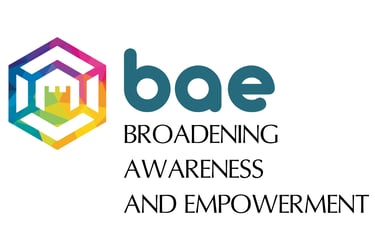BAE Counselling & Therapy centre | KOTA damansara
Understanding Stress, Anxiety, and Depression: A Simple Guide
An easy to read explanations, symptoms, and some helpful advice for everyday life about stress, anxiety and depression.
STRESS, ANXIETY, DEPRESSION
Alix Chan
11/11/20255 min read
Hi there! I’m so glad you’re here and that shows you’re interested in learning about stress, anxiety, and depression. These are big words and big feelings but understanding them can help you and those you love to live a happier life. Just like we take care of our bodies, it’s important to take care of our minds and feelings, too!
Let’s walk together through what each of these words means, how they might show up in your daily life—at work, or at school, in relationships, and with yourself—and what you can do to feel better. We’ll also talk about how they can sometimes be linked together. Remember, you’re not alone in feeling any of these, and it’s always okay to ask for help.
What Is Stress, Anxiety, and Depression?
Stress is like the feeling you get when you have a big homework assignment due, chores to finish, and a pickleball game all in one day. Your brain and body feel “pushed” to get things done. Sometimes, stress can help us focus and get motivated, but too much isn’t fun when we beat ourselves up for not fulfilling the tasks.
Anxiety is when your brain gets stuck worrying about something—whether it’s a test coming up, a difficult conversation, or even things that might not happen at all. Anxiety sticks around, even after the stressful event is over, and makes you feel jumpy or scared inside. It can also prevent you from completing important and meaningful tasks as it can be disguised as procrastination (not all procrastination is linked to anxiety)
Depression is when you feel very down, sad, or empty for a long time—more than just a bad day or a sad moment. It’s like carrying a heavy backpack everywhere, even when you want to play or feel happy. You don’t enjoy the things you previously liked doing.
How Do Stress, Anxiety, and Depression Look in Everyday Life?
Let’s break down what you might see or feel with each one in three areas: work (or school), relationships, and with yourself.
Stress in Everyday Life
· At Work/School: You might feel rushed, have trouble focusing, or get headaches or stomach-aches. Maybe you get angry or cry more easily if things pile up. You might say, “I have so much to do!”
· In Relationships: You could snap at friends or family, feel impatient, or want to be left alone. Stress can make you less patient or caring because your brain is busy worrying.
· With Yourself: You might notice your heart beating fast, sweaty palms, or trouble sleeping. Sometimes, you could feel like you’re not doing a good enough job, even if you are trying your best.
Common Self Script for Stress:
· “I have to do everything perfectly.”
· “I have so much to do, I’ll never get it done.”
· “If I slow down, everything will fall apart.”
· “If I don’t finish this, something bad will happen.”
· “I can’t handle all of this.”
Anxiety in Everyday Life
· At Work/School: You might worry all the time about what could go wrong, even if things are okay. You could feel shaky, have tummy aches, or avoid things that make you nervous. You might freeze up when called on in class or meetings.
· In Relationships: Anxiety can make you afraid people are mad at you or that you’ll say something embarrassing. You might overthink every conversation or apologize a lot, even when you haven’t done anything wrong.
· With Yourself: You might feel restless, have trouble sitting still, or find your thoughts racing. Sometimes, anxiety makes it hard to sleep or eat as usual. You might keep checking things—like if the door’s locked or if you made a mistake.
Common Self Script for Anxiety:
· “What if something bad happens?”
· “People must think I’m weird or annoying.”
· “What if they’re upset with me?”
· “What if I mess up?”
· “What if something terrible happens?”
· “I can’t stop worrying, even though I want to.”
Depression in Everyday Life
· At Work/School: You might lose interest in things you usually like, have trouble getting out of bed, or find it hard to do your work. It could feel pointless to even try.
· In Relationships: Depression might make you want to be alone all the time, or feel like nobody cares about you. You may stop replying to messages or stop making plans with friends and family.
· With Yourself: You could feel very tired, empty, or sad for weeks. Sometimes, you might feel like you’re not good enough or that you don’t matter.
Common Self Script for Depression:
· “Nothing will ever get better.”
· “Nothing matters anymore.”
· “I can’t remember the last time I felt good.”
· “I’m a burden to everyone.”
· “Why should I even try?”
Clear Breakdown of Symptoms
Let’s look at the main signs for each, so you can spot them in yourself or others:
Stress Symptoms
· Headaches, stomachaches, or muscle tension
· Trouble sleeping or nightmares
· Feeling irritated, angry, or moody
· Rushing or forgetting things
· Eating too much or too little
Anxiety Symptoms
· Worrying a lot, even when things are okay
· Restlessness or feeling “on edge”
· Heart racing, sweating, or shaky hands
· Difficulty concentrating
· Trouble sleeping or lots of scary dreams
Depression Symptoms
· Feeling sad, empty, or hopeless for weeks
· Losing interest in things you used to enjoy
· Low energy, feeling tired all the time
· Changes in appetite or sleep
· Thoughts of being worthless or that life isn’t worth living
How Are They Linked? (Comorbidity)
Sometimes, stress, anxiety, and depression can happen at the same time. This is called comorbidity. Imagine them as three friends who sometimes hang out together, even if you don’t want them to! For example, someone who is stressed at work for a long time might start feeling anxious about making mistakes. If this keeps going, they might start feeling down and lose interest in things—signs of depression.
Studies show that people with anxiety often have depression too, and vice versa (Sanderson et al., 2019). This doesn’t mean you will always have all three, but it’s important to know that they sometimes show up together.
First Step Towards Healing
You are not alone. By learning to understand, accept, and compassionately care for your feelings, you are taking the first step towards ownership of yourself. Nothing is more powerful than owning every single part of ourselves, even the darker side of us.
Remember, healing is a journey, and every small step matters. Prepare yourself by managing your expectations (about feeling better) well is also part of your healing journey. Expect downtime as you’re not a machine that can be programmed to fulfil tasks according to the manual.
During times when you are most unexpected, it is true that you may feel worst than the time that you did nothing about it. I reassure you that this is normal and if you feel somedays are heavier than others, you can allow yourself to take a break. Afterall, this is just a pitstop to refuel and recollect yourself for the journey ahead. Stop giving it more meaning than what it already is.
With the right attitude as a learner, and a compassionate carer towards our stress, anxiety or depression, or any of these combination we are already walking the journey towards healing ourselves.


